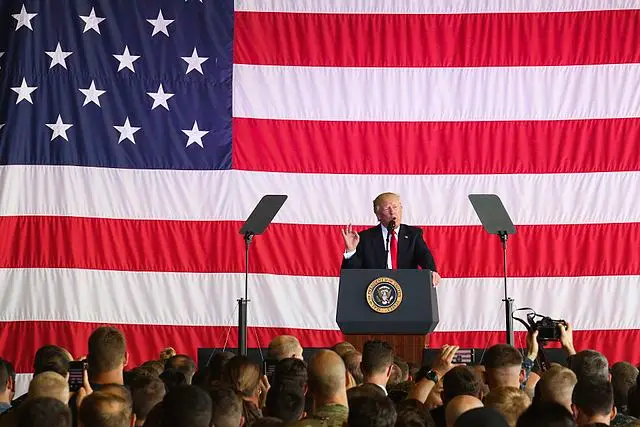Trump’s Tariff Tactics: Why Asian Markets Are Backing Japan’s Diplomatic Move Over China’s Hardline Approach

As trade tensions escalate with US President Donald Trump threatening more tariffs, countries are responding through different strategies—ranging from confrontation to calm negotiation. While China stands firm with retaliation, Japan is quietly opting for diplomacy. Interestingly, Asian markets are showing greater faith in Japan’s negotiation strategy over China’s tough stance.
The Global Tariff Tug-of-War: Japan’s Diplomatic Move vs. China’s Confrontation
Trump’s aggressive tariff threats—like the proposed 50% duty on Chinese imports—have pushed many countries into making tough choices. Three distinct strategies have emerged globally.
China’s response has been to double down. After the US imposed a 34% tariff, Beijing responded with an identical measure. Now, with Trump threatening an additional 50%, China’s Ministry of Commerce has vowed to take all necessary countermeasures. But this tit-for-tat has sent shockwaves through Chinese financial markets. Hong Kong’s Hang Seng index suffered its worst fall in nearly three decades, and investors are nervous about a prolonged standoff.
Despite the pressure, China may have the stamina for a long fight. President Xi Jinping, facing no imminent elections and enjoying consolidated power, is rolling out stimulus packages and pushing for greater domestic consumption to soften the blow of reduced exports.
Why Japan’s Diplomatic Move Is Gaining Market Confidence
Unlike China’s confrontational stance, Japan is taking a more measured path. Tokyo has chosen diplomacy over escalation, preparing to send a team to Washington for talks with US officials. President Trump confirmed a phone conversation with Prime Minister Shigeru Ishiba, where they agreed to negotiate.
This calm approach has resonated positively with investors. The Nikkei 225 surged over 6%, while the broader Topix index climbed nearly 7%. Other Asian markets followed suit, including India’s Sensex and Nifty, both of which bounced back over 1%.
Market optimism reflects the belief that Japan’s diplomatic move could lead to a compromise with the US. If successful, Japan’s strategy could become a model for other nations looking to avoid a damaging trade war while still safeguarding national interests.
The EU’s Balancing Act Between Retaliation and Diplomacy
The European Union is also caught in the crossfire. Trade ministers from all 27 EU member states recently met in Luxembourg to decide their stance. With a trade relationship worth over €1.5 trillion, the EU has a lot at stake.
While European officials prefer a negotiated outcome, they are also preparing retaliatory tariffs as a contingency. Even within the US business community, voices like Elon Musk have surprisingly endorsed the need for diplomatic solutions.
India Weighs Conciliation Over Confrontation in Tariff Talks
India’s response has been muted but strategic. Unlike its earlier stance during Trump’s first term—when it retaliated against US steel and aluminum tariffs—India now seems inclined toward dialogue. Official statements have been minimal, with the government saying it is still evaluating the tariff implications.
Privately, sources indicate New Delhi is leaning toward negotiation, aiming to preserve its trade ties with Washington without escalating tensions. This aligns more closely with Japan’s diplomatic approach than China’s combative playbook.
How Smaller Nations Are Inspired by Japan’s Negotiation Strategy
Smaller export-driven economies are watching Japan’s moves closely. Bangladesh, the second-largest exporter of garments after China, has already offered to buy US agricultural products—especially cotton—duty-free to avoid tariffs. Cambodia and Vietnam are also reportedly considering similar gestures.
These countries understand one thing well: Trump responds positively to symbolic wins. By offering him something to boast about domestically, they might dodge more damaging trade measures.
Will Japan’s Diplomatic Approach to Tariffs Steer Global Market Sentiment?
For global investors, the next steps will be crucial. If Japan can reach a workable solution with Washington, it could ease fears of a full-blown global trade war. Success would not only validate Japan’s negotiation strategy but also encourage others to follow its lead.
However, if talks collapse and tariffs rise further, the fragile optimism in Asian markets could quickly evaporate, leading to widespread volatility.
Final Thoughts: Betting on Diplomacy Over Aggression
This moment is not just about tariffs; it’s a test of international diplomacy. While China chooses resistance and the EU walks a middle path, Japan’s diplomatic move is winning investor trust. As more nations align with negotiation over retaliation, the world may yet find a way to de-escalate this brewing economic conflict without lasting damage.






